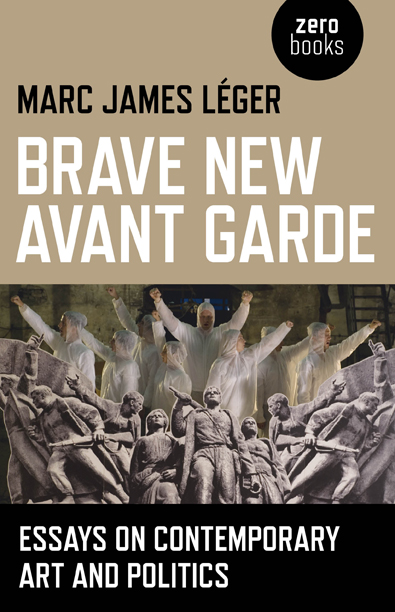Brave New Avant Garde
Brave New Avant Garde provides an unexpected exploration of critical strategies for anticapitalist cultural theory and practice.

Brave New Avant Garde provides an unexpected exploration of critical strategies for anticapitalist cultural theory and practice.
Brave New Avant Garde provides an unexpected exploration of critical strategies for anticapitalist cultural theory and practice.
Art & politics, Criticism & theory
Brave New Avant Garde is a collection of essays that ask the questions: what is an adequate model of contemporary avant garde practice and what are its theoretical premises? With this it asks the related question, echoing Alain Badiou: must the avant garde hypothesis be abandoned? Brave New Avant Garde stands in opposition to postmodern post-politics and the view that radical practice has no other future than its reduction to the workings of the free market in the form of the simple process of cultural production or to variations on the cultural politics of representation. Today's avant garde, formed in the wake of the end of the Soviet Union and the rise of the anti-globalization movement, represents a counter-power that rejects the inevitability of capitalist integration. The way out for artists in today's world of creative industries is defined in these pages as a psychoanalytically informed sinthomeopathic practice, a critical identification with prevailing conditions of production that avoids the surplus enjoyment of the ideology of postmodern pluralism.
Click on the circles below to see more reviews
“Canadian artist and theorist Marc James Léger’s recent collection of essays, Brave New Avant Garde, is … a timely attempt to bring thinking on avant-gardism to bear on this resurgence [of socially engaged art]. As Léger frames the matter towards the end of his book, the present decoupling of activist art and the discourse of avant-gardism may speak to the possibility that ‘extra-institutional socially engaged art has become, for good and bad, the order of the day’.” “Elaborating a theoretical framework of sinthomeopathic art across seven closely linked essays, Léger’s book argues that practices as diverse as those of Fraser, Thomas Hirschhorn, Neue Slowenische Kunst (NSK), Christoph Schlingensief, Komar and Melamid and The Yes Men are all marked by an over-identification with the ‘pathological particularity of culture in the age of late neoliberal capitalism’.” “Pierre Bourdieu’s theory of art’s central role in the reproduction of class inequality is a key touchstone for Léger’s book. Hence, his polemic is ... directed against ... the disappearance of the problematic of class at work in the ‘post-structural reduction of art to a cultural politics of representation’.” http://www.metamute.org/editorial/articles/good-old-avant-garde. ~ Bill Roberts, Mute online
Léger gathers up what remains of the avant garde's once-vaunted radicality and hurls it into a whirling Žižekian accelerator. Like a "pervert's guide" to contemporary art, Brave New Avant Garde reveals a multitude of interventionist practices and rapidly revolving dark particles that in light of recent events in Tunisia and Egypt no longer appear exotic, but instead vibrate prognostic, as if heralding the dawn of a sweeping phase change in twenty-first century art and politics.
~ Gregory Sholette, author of Dark Matter: Art and Politics in the Age of Enterprise Culture
In this critical tour de force, Marc Léger successfully exposes the contradictions that animate contemporary art and that govern the actions of those who "participate in the game of culture" in the age of neoliberalism. And yet Léger is not content to simply critique, he also proposes alternatives through the medium of his concept of a sinthomeopathic cultural praxis, the product of a successful act of balancing on and moving along a pro-avant-gardist tightrope woven of recent politically and socially engaged art practices.
~ David Tomas, author of Beyond the Image Machine: A History of Visual Technologies
Marc James Léger’s informed and thought-provoking analysis of critical art practices and related theories provides essential orientation for anyone looking for ways to resist and subvert what Peter McLaren has defined as the two thieves of capitalism and representative democracy.
~ Oliver Ressler, artist and filmmaker, author of Alternative Economics, Alternative Societies